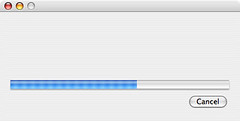sequelguy posted a photo:
calendar.thenewstribune.com/bellevue-wa/venues/show/25896...
For Encode-O-Matic, my encoding tool written in C#, I had to figure out the appropriate DllImport declarations to use IDN Win32 functions which was a pain. To spare others that pain here's the two files CharacterSetEncoding.cs and NationalLanguageSupportUtilities.cs that declare the DllImports for IdnToUnicode, IdnToAscii, NormalizeString, MultiByteToWideChar, and WideCharToMultiByte.
 More of my thoughts have been stolen: In my
previous job the customer wanted a progress bar displayed while information was copied off of proprietary hardware, during which the software didn't get any indication of progress until the copy
was finished. I joked (mostly) that we could display a progress bar that continuously slows down and never quite reaches the end until we know we're done getting info from the hardware. The amount
of progress would be a function of time where as time approaches infinity, progress approaches a value of at most 100 percent.
More of my thoughts have been stolen: In my
previous job the customer wanted a progress bar displayed while information was copied off of proprietary hardware, during which the software didn't get any indication of progress until the copy
was finished. I joked (mostly) that we could display a progress bar that continuously slows down and never quite reaches the end until we know we're done getting info from the hardware. The amount
of progress would be a function of time where as time approaches infinity, progress approaches a value of at most 100 percent.
This is similar to Zeno's Paradox which says you can't cross a room because to do so first you must cross half the room, then you must cross half the remaining distance, then half the remaining again, and so on which means you must take an infinite number of steps. There's also an old joke inspired by Zeno's Paradox. The joke is the prototypical engineering vs sciences joke and is moderately humorous, but I think the fact that Wolfram has an interactive applet demonstrating the joke is funnier than the joke itself.
I recently found Lou Franco's blog post "Using Zeno's Paradox For Progress Bars" which covers the same concept as Zeno's Progress Bar but with real code. Apparently Lou wasn't making a joke and actually used this progress bar in an application. A progress bar that doesn't accurately represent progress seems dishonest. In cases like the Vista Defrag where the software can't make a reasonable guess about how long a process will take the software shouldn't display a progress bar.
Similarly a paper by Chris Harrison "Rethinking the Progress Bar" suggests that if a progress bar speeds up towards the end the user will perceive the operation as taking less time. The paper is interesting, but as in the previous case, I'd rather have progress accurately represented even if it means the user doesn't perceive the operation as being as fast.
Update: I should be clearer about Lou's post. He was actually making a practical and implementable suggestion as to how to handle the case of displaying progress when you have some idea of how long it will take but no indications of progress, whereas my suggestion is impractical and more of a joke concerning displaying progress with no indication of progress nor a general idea of how long it will take.
 I now have search and an archive available for my site. I previously tried to setup crappy search by cheating using Yahoo Pipes and now
instead I have a slightly less crappy search that works over all of the content that I've produced on my blog, uploaded to flickr or youtube, or added to delicious.
I now have search and an archive available for my site. I previously tried to setup crappy search by cheating using Yahoo Pipes and now
instead I have a slightly less crappy search that works over all of the content that I've produced on my blog, uploaded to flickr or youtube, or added to delicious.
You can now read my first LiveJournal blog post or, for probably much more entertainment value, view all the photos and videos of Cadbury by searching for 'bunny'.
The search is only slightly less lame because although it searches over all my content, I still implemented it myself rather than getting a professional package. Also, the feed supports the same search and archive as my homepage so you can subscribe to a feed of Cadbury if you're so inclined and just skip all this other boring stuff. My homepage and feed implement the OpenSearch response elements and I've got an OpenSearch search provider (source) as well.

 With the new features of IE8 there's several easy ways to integrate Gmail, Google's web mail service, for mail composition, searching, and monitoring that I enjoy using.
With the new features of IE8 there's several easy ways to integrate Gmail, Google's web mail service, for mail composition, searching, and monitoring that I enjoy using.